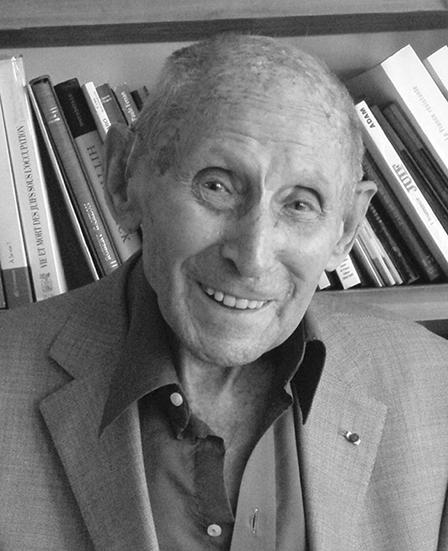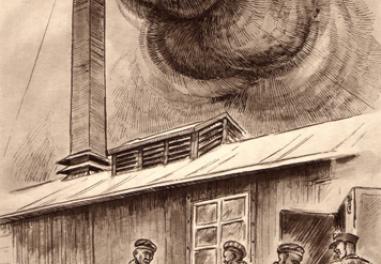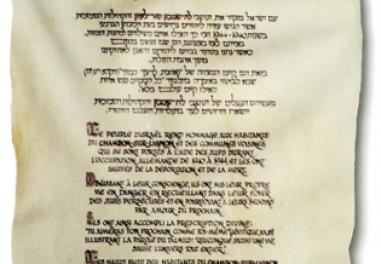Georges Loinger
Georges Loinger, now 104 years old, was one of the leaders of the Œuvre de secours aux enfants (OSE – Children's Aid Society) during the Occupation, which organised the rescue of several thousand Jewish children. This great French resistance fighter remembers the reasons behind his commitment and his action.

How did you see the rise of Nazism across the Rhine?
I was born in Strasbourg, where my family lived, in 1910, so I was born German. Then, during my teen-age years, I belonged to the young Zionist movement Hatikvah (Hope), founded by Theodore Herzl, and I became one of its leaders.
Living in a cosmopolitan university town like Strasbourg, and being a member of a youth movement, I was very interested in what was going on in the world, and especially in Germany. During the years 1925-1930, we started to hear a voice on the German radio that was strange, powerful, fearsome… a voice that was made for convincing people. It announced a tragedy: "I am going to exterminate the Jews" Hitler shrieked. And he was getting ready to seize power…
We then knew that the future was going to be difficult. Many of us in Strasbourg heard him and we got ready for the worst. Especially since we were starting to see refugees flooding in to escape the persecutions.
I abandoned my engineering studies and took up teaching physical education – I was already very athletic – with the intention of preparing and training Jewish youth for the ordeal that awaited them. I also worked as a teacher for Baroness Edouard de Rothschild's social works. After long negotiations, she, who was worried about the fate of Jewish children whose parents had been imprisoned in Germany, managed to buy 123 children from the Nazis at an exorbitant price. My wife took care of the little refugees at the Château de la Guette, in the Seine-et-Marne department.
Then the war broke out…
I was 29 and I was mobilised. Soon after I was taken prisoner with my regiment in Bavaria, where I was imprisoned at Stalag 7. I managed to escape at the end of 1940. I crossed Germany and came back to France. I went to work for the Œuvre de secours aux enfants (OSE – Children's Aid Society), which hid and protected nearly 1,500 Jewish children in fourteen houses. But, starting in the summer of 1942, our strategy changed – given the growing threat and after the German invasion of the Free Zone, it became too dangerous to group the children together in the houses. The decision was taken to disperse the children under our care and to send them abroad to areas where they would be safe from deportation. We then had to organise their exfiltration.
How did that work?
We took the children in small groups from France to Switzerland. Things went quite well at first. The Italians guarded the Franco-Swiss border and were fairly kind. Actually, they closed their eyes or looked the other way. My role consisted in picking up the groups at the train station in Annemasse. I took the children to a municipal reception centre. The mayor, Jean Deffaugt, was one of our supporters. The children stayed there for the night and the next morning we called upon the smugglers who, for a fee, guided the children to the other side of the border. The trip took about an hour. In the end we had managed to get nearly 350 of them through.
In 1943, the Germans replaced the Italians. What impact did that have on your activities?
After Fascist Italy's capitulation in September 1943, the Italian troops, and notably those guarding the borders, withdrew. The Germans immediately replaced them. And indeed, things did change. We continued our activities, but it was very difficult. Then I found out that the Germans were looking for me and, in February 1944, the Gestapo raided the OSE offices in Chambéry. We came very close to being arrested. Once my family had been taken to safety, I returned to Annemasse where I continued my activities with the OSE until the Liberation.
Read more
Bibliography :
L'odyssée d'un résistant, Georges Loinger, Les éditions Ovadia, 2013.
Les résistances juives pendant l'Occupation, Georges Loinger, éditions Albin Michel, 2010.
Articles of the review
-
The file

1945, horror revealed
In the first months of 1945, the Allied armies liberated the Nazi camps one by one and discovered the scope of the massacres. In April, pictures of the horror were transmitted around the world and the survivors' repatriation was organised. Yet it took years to understand the reality of the concentra...Read more -
The event

Natzweiler-Struthof Concentration Camp
Read more -
The figure

A land of the Righteous
During the Occupation, the residents of Le Chambon-sur-Lignon and the neighbouring villages saved many Jews. It was such a unique example of civic and spiritual resistance on such a scale that the town and the region received a diploma of honour from Yad Vashem in 1990.
Read more

